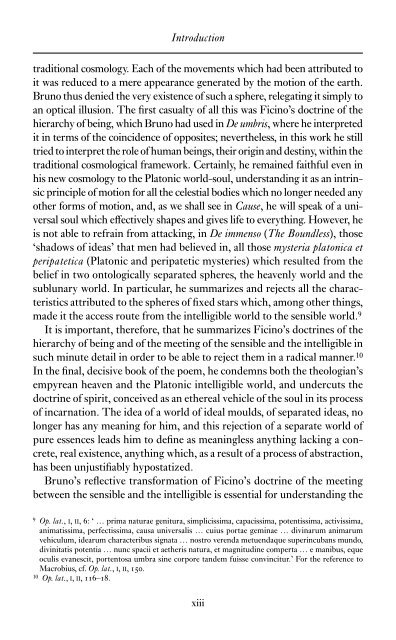You also want an ePaper? Increase the reach of your titles
YUMPU automatically turns print PDFs into web optimized ePapers that Google loves.
Introduction<br />
traditional cosmology. Each of the movements which had been attributed to<br />
it was reduced to a mere appearance generated by the motion of the earth.<br />
Bruno thus denied the very existence of such a sphere, relegating it simply to<br />
an optical illusion. The first casualty of all this was Ficino’s doctrine of the<br />
hierarchy of being, which Bruno had used in De umbris, where he interpreted<br />
it in terms of the coincidence of opposites; nevertheless, in this work he still<br />
tried to interpret the role of human beings, their origin and destiny, within the<br />
traditional cosmological framework. Certainly, he remained faithful even in<br />
his new cosmology to the Platonic world-soul, understanding it as an intrinsic<br />
principle of motion for all the celestial bodies which no longer needed any<br />
other forms of motion, and, as we shall see in <strong>Cause</strong>, he will speak of a universal<br />
soul which effectively shapes and gives life to everything. However, he<br />
is not able to refrain from attacking, in De immenso (The Boundless), those<br />
‘shadows of ideas’ that men had believed in, all those mysteria platonica et<br />
peripatetica (Platonic and peripatetic mysteries) which resulted from the<br />
belief in two ontologically separated spheres, the heavenly world and the<br />
sublunary world. In particular, he summarizes and rejects all the characteristics<br />
attributed to the spheres of fixed stars which, among other things,<br />
made it the access route from the intelligible world to the sensible world. 9<br />
It is important, therefore, that he summarizes Ficino’s doctrines of the<br />
hierarchy of being and of the meeting of the sensible and the intelligible in<br />
such minute detail in order to be able to reject them in a radical manner. 10<br />
In the final, decisive book of the poem, he condemns both the theologian’s<br />
empyrean heaven and the Platonic intelligible world, and undercuts the<br />
doctrine of spirit, conceived as an ethereal vehicle of the soul in its process<br />
of incarnation. The idea of a world of ideal moulds, of separated ideas, no<br />
longer has any meaning for him, and this rejection of a separate world of<br />
pure essences leads him to define as meaningless anything lacking a concrete,<br />
real existence, anything which, as a result of a process of abstraction,<br />
has been unjustifiably hypostatized.<br />
Bruno’s reflective transformation of Ficino’s doctrine of the meeting<br />
between the sensible and the intelligible is essential for understanding the<br />
9 Op. lat., I, II, 6: ‘ … prima naturae genitura, simplicissima, capacissima, potentissima, activissima,<br />
animatissima, perfectissima, causa universalis … cuius portae geminae … divinarum animarum<br />
vehiculum, idearum characteribus signata … nostro verenda metuendaque superincubans mundo,<br />
divinitatis potentia … nunc spacii et aetheris natura, et magnitudine comperta … e manibus, eque<br />
oculis evanescit, portentosa umbra sine corpore tandem fuisse convincitur.’ For the reference to<br />
Macrobius, cf. Op. lat., I, II, 150.<br />
10 Op. lat., I, II, 116–18.<br />
xiii

















